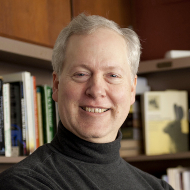Why teach evolution? A school administrator might answer simply that the district teaches evolution because it a required part of the science curriculum. Evolution is in the standards and a school would be derelict in its educational duty if its textbooks and curriculum failed to include it. Scientists would give a more substantive answer, highlighting why it is in the standards in the first place and why it ought to be taught even where no formal standards exist. Teach evolution, they would answer, because it is the foundation of biology; Darwin's law of evolution by natural selection and the other core elements of evolutionary science provide the unifying explanatory framework for the whole field. Philosophers of science, who focus on the methods and practices of science, might answer that we should teach evolution because it is an exemplary model of how science works and helps one develop a scientific mindset.
Why teach (and learn) about evolution?
Why teach evolution? Robert T. Pennock of Michigan State University answers the question from myriad perspectives.
Let us also ask the question from a student’s point of view: Why learn evolution?
These are all excellent reasons to teach evolution, but we need to remember that teaching is a relational practice. There is no teacher without a learner. So, let us also ask the question from a student's point of view: Why learn evolution?
Secondary school students might initially answer like an administrator and think of learning evolution because it is required. Yes, class, evolution will be on the exam. Not just on biology tests, but also, for example, on the medical college admission test, the MCAT. Undergraduate students will begin to awaken to the scientific import of evolutionary science for medicine and other fields, and advanced students will recognize its practical utility. To adapt Randy Nesse’s trenchant catchphrase, learning medicine (or agriculture, and so on) without evolution is like learning engineering without physics. Indeed, we are at a point where one shouldn't even study engineering without evolution, as advances in digital evolution now make it possible to harness evolution to create engineering designs that can surpass those of unaided engineers. Evolutionary computing, which implements Darwin's law so that programs can compete and evolve by natural selection, is also driving new advances in artificial intelligence. Evolution is often smarter than you are, so smart students will want to learn to use it. Learn evolution because it truly works.
Finally, there is a deeper answer that unites both views. As Darwin himself noted, there is something more basic to science than its practical benefits, significant as those may be. He recognized within himself an instinctual drive for knowledge and discovery that motivated his scientific research. If you have ever looked at the biological world and wondered why it exhibits such wonderful adaptations and diversity—and who hasn't?— then you know what Darwin meant. Scientists may feel this drive most keenly, but it is part of every person's psyche—we are curious creatures. Why teach and learn evolution? Because it helps answer many of these profound questions about ourselves and the world we are one with, and because it opens the door, and the mind, to new questions waiting to be pursued.

